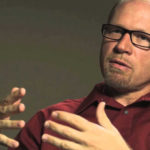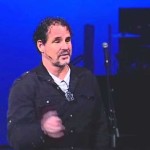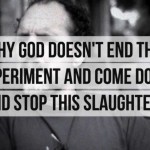We run our website the way we wished the whole internet worked: we provide high quality original content with no ads. We are funded solely by your direct support. Please consider supporting this project.
The Risk of Love & the Source of Evil

Image by Gualtiero via Flickr
On Sunday Greg tweeted the following:
Love IS a tremendous risk. But if humans ever concluded the risk was not worth it, we likely become extinct rather quickly. …
Yes, love is risky. It costs us everything, and we sometimes get terribly hurt. But it’s this risk that “makes the world go round.” …
And it seems to me that, once we accept that the risk inherent in love is worth it– for us AND for GOD–the problem of evil is resolved.
Here are some further reflections of Greg’s on the risk of love.
While there will always be a great deal of mystery as to why specific evil events transpire the way they do, the Bible does give us an answer as to how evil originates. It has to do with this precious and dangerous thing called free will.
God could have easily created a world in which nothing evil could never happen. But this world would not have been capable of love. Certainly God could have preprogrammed agents to say loving things and to act in loving ways. He could even have preprogrammed these automatons to believe they were choosing to love. But these preprogrammed agents would not genuinely be loving. Love can only be genuine if it’s freely chosen. Which means, unless a personal agent has the capacity to choose against love, they don’t really have the capacity to choose for it.
In fact, if you think deeply about it, I think you’ll agree that the concept of a “preprogrammed lover “ is completely meaningless,—similar to the concept of a “married bachelor” or a “round triangle.” The reason God can’t create these things is not that he lacks any power, but because a “married bachelor” and a “round triangle” are self-contradictory. They’re equivalent to nothingness, so it’s no limitation on God to say he can’t create them. So too, the reason God can’t create a “preprogrammed lover” is because the very idea of an agent who is capable of love but not capable of choosing against love is meaningless.
So, if God’s primary purpose in creation is raising up a people who are capable of receiving and reflecting his love and carrying out his will “on earth as it is in heaven,” these people will have to have the potential to choose against love. The same is true of angels. And this is how all evil originates. The price of the possibility of love is freedom, and with freedom comes the possibility of evil.
Though some Christians unfortunately think God’s will includes evil, the Bible depicts sin as evil precisely because it constitutes a rejection of God’s will. For example, Scripture says that the lawyers and Sadducees of Jesus’ day sin because they “rejected God’s purpose for themselves” (Lk 7:30, emphasis added). So too, through Isaiah the Lord says to the children of Israel:
Oh, rebellious children, says the LORD,
who carry out a plan, but not mine;
who make an alliance, but against my will,
adding sin to sin. (Is. 30:1, emphasis added)
As C.S. Lewis noted in Mere Christianity, this is the most amazing aspect of creation: the omnipotent God created beings who have the capacity to reject him. He could have created a world that necessarily conforms to his every whim, but while this sort of creation would obviously be devoid of any evil or suffering, it also would be devoid of love.
This only touches the surface on what the Bible has to say about free will. I’ll say more in tomorrow’s post.
Category: General
Tags: Free Will, Love, Problem of Evil
Related Reading

Why Can’t God Stop Evil? The Thomas J. Oord Interview (podcast)
Greg and Thomas talk about Open Theism and how Greg’s views differ from Thomas’s. Theology nerds, get your compass and your flashlight and prepare to go DEEEEEP in the weeds! Thomas’s book: God Can’t Episode 487 http://traffic.libsyn.com/askgregboyd/Episode_0487.mp3

How To Talk about Theology
Social media is full of theological debate. Theological arguments that formerly took months or even years to get in print, now only takes the time to write a post or 140 characters and click “publish.” Social media is great in that it makes space for all of our voices. However, it also seems to elevate…

What To Do with the Bible’s Talk of Satan
Recently, Roger Olson raised the question on his blog about why Satan is ignored in modern theology. He observed how Greg’s theology takes an “obvious, ‘up front,’ blatant belief in a very personal, very real, very active Satan who has great power in the world.” Because we often have so little to say about Satan…

Does the Open View Undermine God’s Sovereignty?
A common objection to the concept of a risk-taking God is that it seems to undermine God’s sovereignty. If any particular individual can opt out of God’s plan, then every individual could conceivably opt out of God’s plan, and it seems that God’s entire plan for world history could ultimately fail. Some have argued that…

Sermon Clip: The Worst of Sinners
In this short clip, Greg Boyd discusses Paul’s definition of love. In the full sermon, Greg talks about how in this dog eat dog world, we’re programmed to judge others. But to love others with unsurpassable worth, we must ascribe worth to them at cost to ourselves. In this sermon, Greg talks about how to…

Divine Wisdom
Why doesn’t God end it all and stop the slaughter? Why does God allow suffering and evil to go on so long? Here, Greg offers two possible answers to these questions. Option A is that all evil somehow is designed by God and somehow brings glory to him. But Greg thinks Option B is a better explanation, and it involves…
